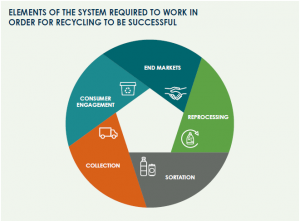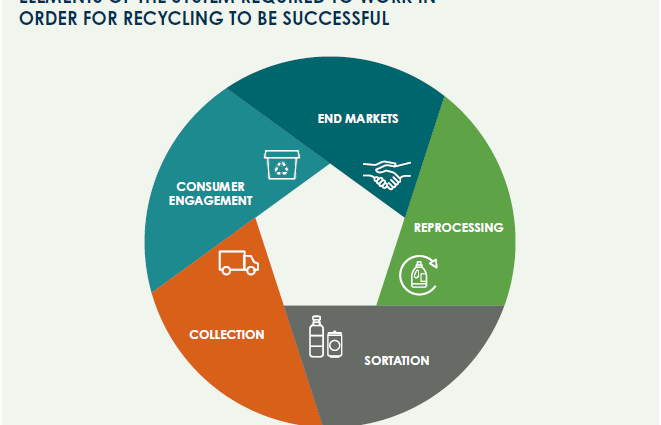
The Recycling Partnership, a non-profit that seeks to revolutionize U.S. recycling practices, recently released its first report that roadmaps how the industry can transition into a circular economy.
The model of a circular economy, which has received increasing global attention, is a closed-loop system of production and consumption where objects are reused, recycled, and transformed, thus reducing waste. By contrast, the current U.S. linear economy relies on single-use practices that result in greater waste.
According to the report, “The Bridge to Circularity: Putting the ‘New Plastics Economy’ into Practice in the U.S.,” there is no single action to transition the underfunded recycling industry into a circular economy. Rather, the report examines three industry-wide issues and provides a roadmap to transition the industry into part of a circular economy.
The partnership estimates the need of $500 million dollars to fund the initiatives.
The report is endorsed by the Ellen MacArthur Foundation, a non-profit that works with various sectors in the U.S. to promote the transition into a national circular economy. The foundation issued a global challenge for a New Plastics Economy that unites over 400 public and private entities to lessen plastic waste and pollution.
The Recycling Partnership’s report outlines three industry issues and solutions:
First: The U.S. recycling infrastructure is not able to support the pace of packaging innovation. The report’s solution is a pathway to recyclability that calls for improvements to make plastics and other materials more recyclable.
Second: The U.S. cannot meet the demand for recycled materials necessary for the Ellen MacArthur Foundation’s global commitment. The report’s solution promotes the use of $250 million dollars to take 340 million pounds of post-consumer plastics and over 2 billion pounds of other packaging for the use of benefitting communities.
Third: The U.S. has underlying challenges when developing a more efficient recycling system. The report’s solution calls for a “Recycling 2.0.” initiative to use another $250 million dollars over five years to overhaul the current recycling system, with improved technology, better data systems, and more consumer participation.
The report is found here: https://recyclingpartnership.org/circularity/
Written by Nicole Foulke

